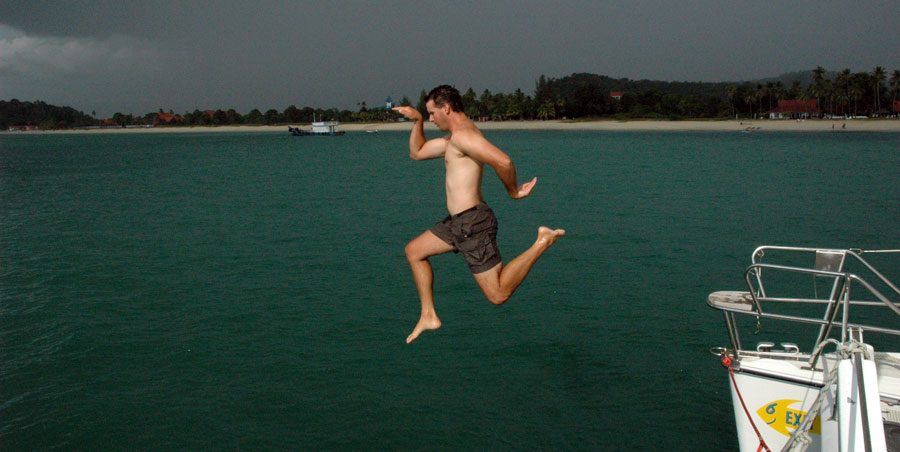34 THINGS I HAVE
LEARNED IN 33,000 MILES
1. Mom likes to say “the journey is the destination”. She’s
right. Although we sailed from point to point on a map, locations were
only a skeleton on which to build our adventure.
2. You find what you’re looking for. The cruises who talk about
the dangers lurking in each location are invariably the ones who find
trouble. Cruisers who make smart decisions and keep a positive attitude
somehow manage to find good stuff in the same places and enjoy
themselves much more.
3. Cruising is a great investment of time.
4. If I have children, I will take them cruising. They will thank
me.
5. There is no shortage of adventure in the world but most of the
real ones aren’t easy.
6. For every Paris or Rome there are a thousand hidden corners of
the globe where people like you and me make a life. The corners are
usually where my favorite memories originate.
7. Cruising let’s you share a back porch with a billionaire. In
Turkey we anchored next to a diamond merchant’s 200 foot megayacht for
two days. He spent 50 million dollars to visit the same destination as
us. Some people buy floating condominiums and some people buy the
sailing equivalent of a cargo crate, but we all meet at the same
barbecue pit on the beach.
8. There is always something to do on a boat. You are
never, ever bored.
9. The Caribbean is high quality cruising. The Bahamas are
shockingly beautiful. Who knew there are such awesome destinations so
close to the States?
10. Ocean crossing is mostly about persistence. Just point the
boat in the right direction, don’t hit anything for a few days, and
you’re good to go.
11. Reality TV is stupid.
12. One of my favorite things about cruising is how every day is
different. You never know what wrinkles will be thrown into your
schedule so you might as well take off your wristwatch.
13. Don’t use pens from the desk of an Immigration officer
without asking for permission first.
14. Lost in an arid, desolate land? Shipwrecked on a deserted
island? Trapped in a canyon by a pack of hyenas? Never fear. They'll
build a new Starbucks at your location within the week.
15. When locals point to the next island as “dangerous”, there
are usually people on that island pointing back at them and saying the
same thing.
16. Other yachties refer to you by your boat name (for example,
if our friends on Duetto were talking about us they might say “Exit
Only are brilliant mariners”). Remember this when you get the urge
to name your vessel La Cucaracha.
17. There is something wonderfully mysterious about harnessing
the wind to travel.
18. Always learn a few phrases in the local language. People
appreciate the effort and it’s a great way to make new friends. (NOTE:
be sure to know the exact meaning of your newfound phrases before
you shout them across crowded rooms at sword-toting strangers)
19. Never overestimate the common sense of charter boats when it
comes to anchoring. I don’t want to sound negative but you would not
believe some of the stuff we’ve seen in the Caribbean. Usually the
accidents happen because they don’t observe the First Rule of Doing
Anything on a Boat (see #20).
20. Slow is better than fast. Disasters usually happen because
someone is trying to accomplish something too fast. It's similar to
operating a chainsaw in this respect.
21. It is OK to say "no, thanks" when pressured to buy something.
If the vendor still refuses to acknowledge your right not to part with
your hard earned cash, shout newly learned local phrases (NOTE: unless
the seller has a sword...in which case, buy something from them.
Preferably a shield or a larger sword).
22. On the extremely rare occasions when we’ve been pressured for
a bribe, a polite “no” has worked. This seems to be the consensus
opinion of most cruisers and travelers I know.
23. You find good people wherever you go.
24. God loves every single person on this planet. I know it
sounds glib but this thought keeps popping into the forefront of my mind
as we travel. That Maldivian lady fishing on the end of the pier? God
loves her. The rich Italian punk who ripped by in a speedboat and rocked
us with a huge wake? God loves him. The guy in Grenada who snuck onto
our boat at night and didn’t see anything worth taking, but left muddy
footprints? God loves him. The lady who smiled and gave us extra bread
at the market in Sudan? God loves her. The list goes on forever. It is
such a mind-blowing idea and it makes me want to treat other people
better because we when you get right down to it, we‘re all the same. By
the way, God loves you too.
25. Cruising isn‘t always fun. Long night watches, rough
passages, boat maintenance, getting trapped on board for days of
non-stop rain, living in close proximity with three other adults (two of
whom are your parents), lightning storms, relatives who don’t
understand, living at the mercy of the weather, frequent discomfort,
traveling at speeds which make a snail on a unicycle look fast, and
intermittent contact with shore-based friends are all part of the deal.
But it’s worth it.
26. All ocean passages include a few hours when ice cream is the
sole topic of conversation.
27. It would have been nice to have a freezer on board.
28. A good hat is worth it’s weight in ice cream. I lucked out
and found an Australian cowboy hat with enough stiffness and brim width
to serve as my personal umbrella.

29. Never trust a strange camel.
30. Every Diet Coke manufacturer uses a slightly different
recipe. The flavors range from "Throat-chokingly Harsh" to "Heavenly
Nectar". Always check which it is before you buy 12 cases.
31. You know how all the pictures from the 1800s and 1900s show
people with serious faces? I guess photographs were too rare to waste on
tomfoolery and goofy smiles. Interestingly, many eastern cultures are
modern day proponents of “straight faced” photography. People are
affable and smiling in conversation until I ask if I can take a photo,
whereupon they straighten up and get serious.
It makes me wonder about my natural inclination to act like a goofball
whenever anyone points a camera at me. At the very least I usually
smile. Why? Am I trying to inject happiness into a memory which might
otherwise appear bland? How many times have you seen an arguing couple
on vacation stop and smile while a stranger takes their picture, then go
right back to arguing? What will they remember of their trip when they
look back at their photos?
32. Daily radio nets are a great way to keep morale up on the
open ocean. Especially if you are the one with the best fishing story.
33. Humanity has a startling history of warfare. Sometimes I felt
like we were touring the world from fortress to fortress. Leading me to
my next reflection…..
34. This might not be a popular point of view but I think it is
worth considering: How arrogant is it that Europeans (and I include my
own ancestry in this category) had the gall to land on islands populated
by natives and claim them in the name of their homeland? In school I was
taught that European colonial expansion was motivated by “God, gold, and
glory”. They achieved these goals thanks to superior military technology
(they had the guns).
Imagine if aliens from the nearby Chewbaccan galaxy landed a spaceship
on South Beach (in Miami) and claimed Florida as part of the Chewbaccan
Republic…never mind the high rise buildings full of Canadians….or the
sun-drenched beach revelers angry about the spaceship blocking their
sun…or the fact that no one wants to subjugate themselves to a Republic
named after a sidekick (“We bow to no one but Han Solo!”). The
aliens aren’t concerned because they have energy cannons, sonic
blasters, and shields which make them impervious to anything Will Smith
or Tom Cruise can do. If the Chewbaccans want Florida, we are helpless
to stop them.
Click on this
button to tell your friends about "34 Things I Have Learned In 33,000
Miles".

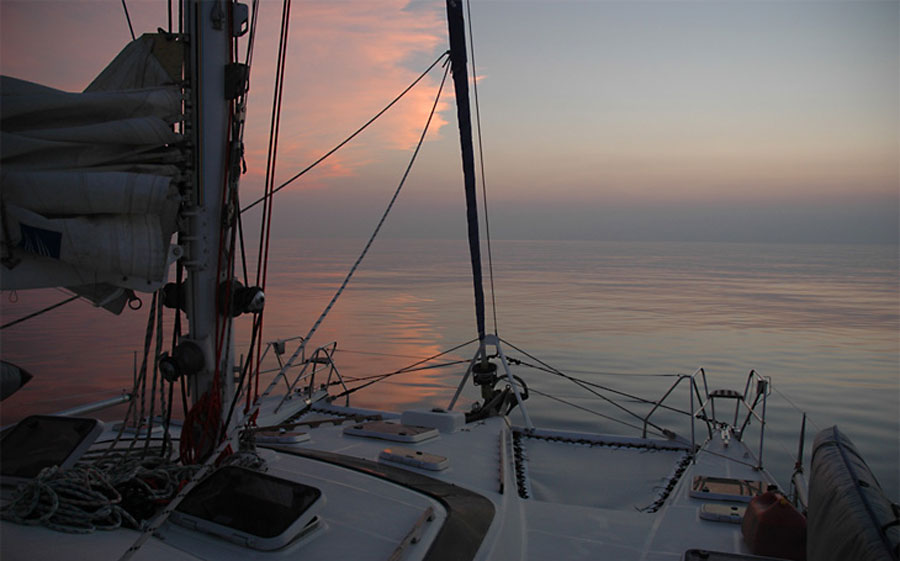
SPACE TRAVELERS
Sometimes when you sail offshore, the
horizon disappears, and you can't tell where the water ends, and the
heavens begin. You feel like you are floating in space. Once you're
out of sight of land and the sun goes down, there's blackness beneath
you and the Milky Way above. Billions of galaxies twinkle in the
darkness and surround you on all sides. A feeling of mystery and
oneness with the universe descends on you as your yacht sails on through
the night.
Did
you ever want to leave your earth-bound existence behind and travel in
outer space to the far reaches of the galaxy? I have felt that way too
many times to count, and I suspect the thought has crossed your mind as
well. The good news is that you can do it - sort of. I'll explain how.
When
astronauts blast off into orbit on the space shuttle, they end up only a
few hundred miles above planet earth. In the space station they are
less than three-hundred miles from the nearest land (directly beneath
them). When I blasted off across the Pacific Ocean in Exit Only, I was
fifteen hundred miles from the nearest land as I sailed to French
Polynesia. My crew and I were on our own; there was no mission control
to guide us on our way. Just like the space shuttle, we had to be
self-sufficient in all areas. Although we didn't have to carry oxygen
like space travelers, we had to take food, water, and enough survival
supplies to last several months in case something went wrong.
I realize Exit Only isn't the Millennium Falcon and that we are
traveling at substantially less than the speed of light. Nevertheless,
we are out there on our own in our small part of the Milky Way Galaxy.
The fact that we are floating on the interface between two fluids (water
and air) does not diminish the adventure we feel as we travel through
near space. The fact that we are flying at only six knots on our
journey does not erase our sense of achievement when we return from near
space and place our feet on dry land.
Although most people don't think of themselves as intergalactic
travelers, all of us are living on spaceship earth. Our planet hurtles
through the galaxy at thousands of miles per hour. When city folks
look up in the sky at night they can't see the stars because of the
light pollution, and they forget they traveling on a spaceship. Sailor
are different. When sailors look up in the night sky, they know that
they are space travelers immersed in the Milky Way.
Just
because you're not riding in the space shuttle doesn't mean you are not
an astronaut. Every time you weigh anchor and sail into the unknown,
you blast off in your spaceship. An astronaut in the space shuttle and
a sailor on a dark night at sea both see the same thing. Although the
astronaut is in near space, and the sailor in nearer space, both of them
see millions of miles in every direction with their naked eyes.
Those of you who feel like your life is going nowhere need to go out in
wilderness far from the cities and look up into the night sky. You will
instantly understand what I'm talking about. You'll forget about your
woes, and a sense of awe will overwhelm your heart and mind, because you
too are a space traveler. You might even give up your land-locked
existence and explore the galaxy in a spaceship of your own. Just raise
your sails and point the bow of your small ship toward the Marquesas
Islands of French Polynesia, and before long, near space will be your
home.
Space travel....... I love it.
Life is good.
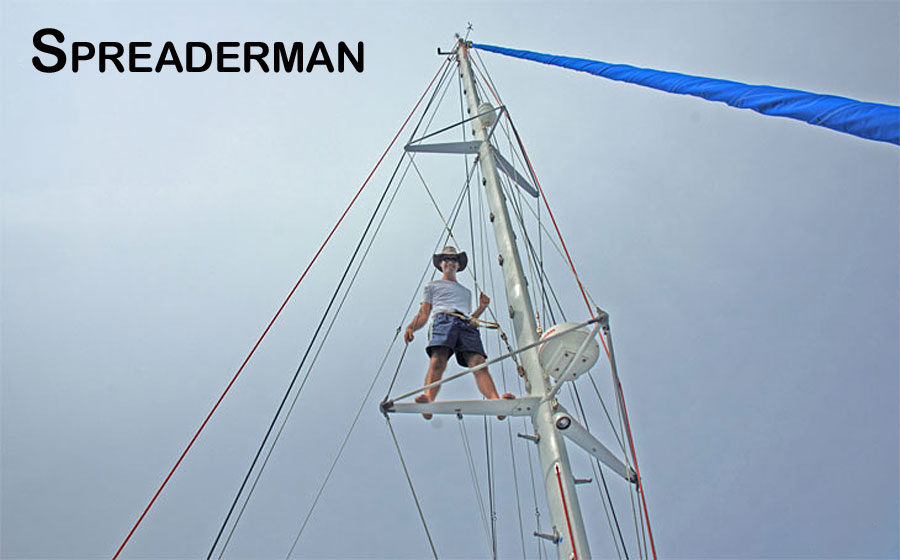
SPREADERMAN
Look up in the sky. It's a bird, it's a
plane, no, it's Spreaderman. Don't think I'm confused. It's definitely
not Superman or Spiderman up in the rigging. It's Spreaderman standing
on our mast spreaders guiding us through the coral reef as we sail the
turquoise waters of Coral World. Whenever we do shallow water sailing,
we always put out a call to Spreaderman to keep us out of trouble.
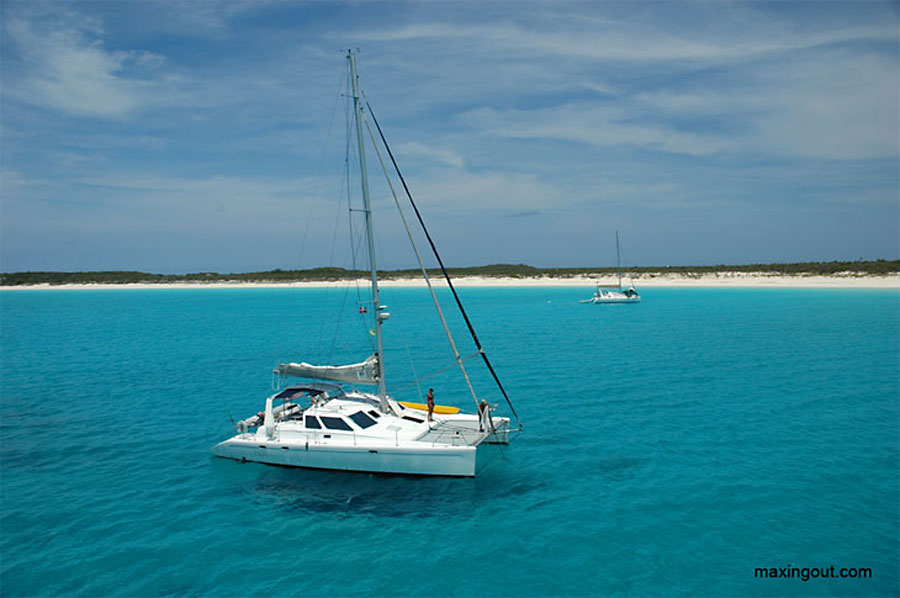
This is what Spreaderman is looking for when we come into an anchorage.
He wants turquoise water in all directions as far as his eye can see.
As long as the water is totally turquoise, there will be no rocks or
reefs to ruin our day. This anchorage in Conception Island in the
Bahamas has scattered coral heads that could punch a hole in our hull if
we don't pay attention to where we are sailing as we approach the
island. The water between the two sailboats in this picture is between
eight and fifteen feet deep, and there are no brown coral heads in
sight.

This water is four to five feet deep over a white sand bottom. When I
anchor in water like this, words like paradise start popping into my
mind.
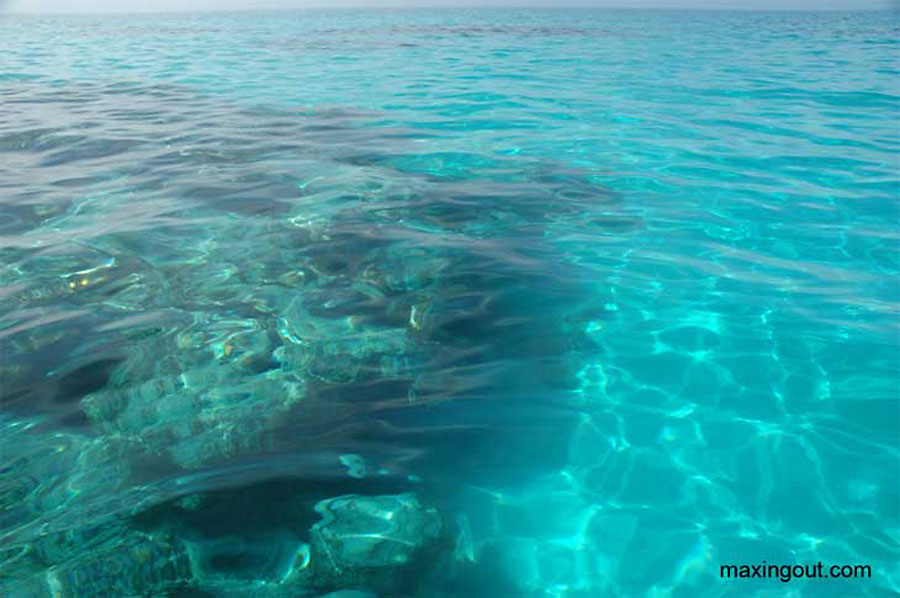
When Spreaderman looks down, he is checking the color of the water; dark
brownish patches are rocks or reefs, greenish patches are sea grass, and
turquoise is sandy seabed. Isolated patches of coral are called coral
heads or "bommies". On the right side of this picture, you are in
paradise, and on the left side you are in purgatory or worse. If you
run into this reef day or night, it could be the end of your voyage.
You can't see coral reefs when the sun is directly in front of you. The
reflected sunlight blinds you to the presence of dangerous reefs.
That's why you only enter tropical anchorages with the sun high overhead
or behind you. Thousands of boats have been lost when they sailed
directly onto a reef they couldn't see because the sun was in front of
them.
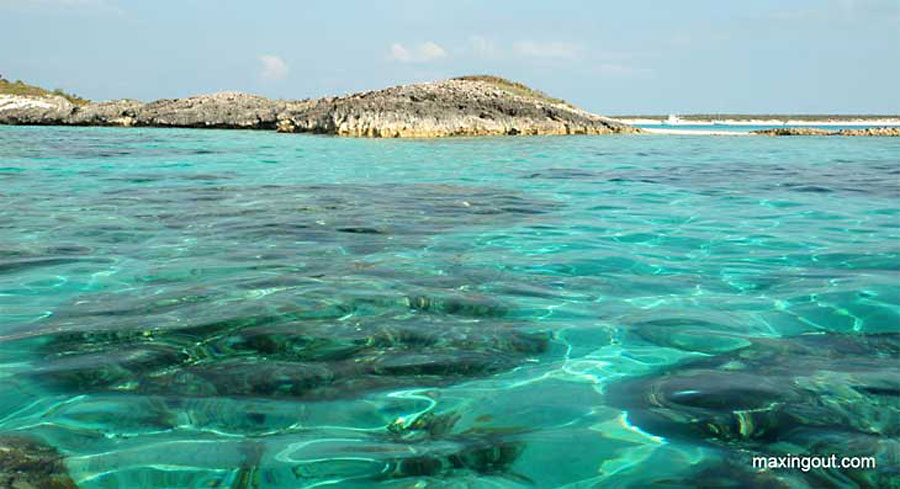
If this what Spreaderman sees from his perch on the mast, something has
gone badly wrong. The yacht is surrounded by coral heads, and it's time
to back up, slowly and straight, to avoid disaster.
We
stand on the spreaders rather than using a true crow's nest on the
mast. We got an estimate in Australia to see how much it would cost to
construct a real crow's nest, and they reckoned it would require about a
thousand dollars to fabricate and install one. That's big money to
spend on an item that will only be used when navigating in coral.
That's why we use our spreaders as our poor man's crow's nest.
I installed fold-out mast steps all the way to the top of my fifty foot
mast. Those steps are the stairway used by Spreaderman as he navigates
Exit Only through coral in the Bahamas, Caribbean, and South Pacific.
When it's time to go aloft for a look, Spreaderman folds out the mast
steps and climbs to the first set of spreaders one-third of the way up
the mast. From twenty-five feet above the water, it easier to detect
coral reefs and bommies that lie dead ahead. His elevated point of view
prevents Exit Only from getting boxed into coral traps.
When
you anchor among coral heads, you need to look around your boat for 360
degrees to make sure there are no bommies that could cause a problem if
you drag anchor or if the the wind or tide shifts during the night.
When it's pitch black on a moonless night, there's no way to tell the
location of the coral heads. Coral reefs don't move, but boats drag
anchor and swing their position with changes in wind and tide, and
prudent mariners make sure there are no threatening coral heads in the
vicinity of where they drop their anchor.
When you make a mistake, God forgives you,
but coral does not. Coral punishes you relentlessly for every mistake
you make, and it punishes you in the middle of the night during your
time of greatest vulnerability.
So what do you do when you anchor in coral? Call Spreaderman, and let
him take the worry out of Coral World. After all, there's nothing more
beautiful than putting your anchor down in six feet of crystal clear
turquoise water, and when Spreaderman makes sure you're not near any
coral heads, you know beyond all doubt that life is good.
